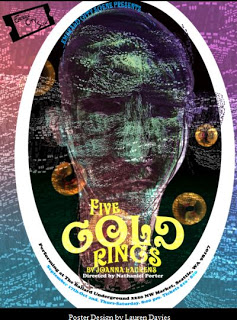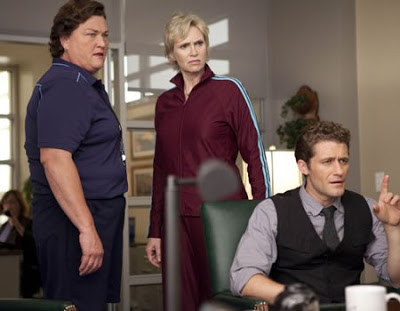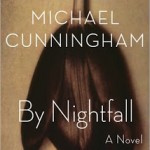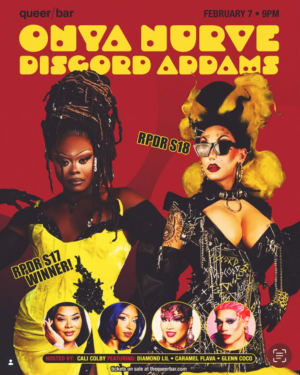Review: Five Gold Rings by Joanna Laurens. Produced by Emerald City Scene at The Ballard Underground. Directed by Nathaniel Porter. With David Carlson, Solomon Davis, Adrienne Littleton, Kelli Mohrbacher and Jesse Parce. Now through Oct 2.
Why are some reviews so difficult to write? I’m having a helluva time putting my feelings, opinions and reflections about Emerald City Scene’s production of “Five Gold Rings” into a logical, coherent series of words and sentences. To start with, the entire experience of GETTING to this play was an ordeal. I had to borrow a car to go to Ballard and it was a car I’d never driven before, and it was raining, and I couldn’t figure out how to work the wipers, or how to adjust the seat, and it was some sort of crappy Chevy with bad sightlines, and did I mention it was last Friday when it was raining so damn hard? I made it to Ballard in one piece and found a parking spot relatively easy but had a helluva time FINDING the theater itself and by the time I had, it was almost 8:10 and since they started the play pretty much right after I arrived, I think they might have been waiting for ME so that made me feel self-conscious and guilty. On top of that, this was a production of an unknown (to me) play by a small fringe theater group with a tiny budget, unknown actors (also, to me) and it was in a basement and I HATE basement theaters, (though I understand the economic necessities of arts groups being forced to take the cheapest available space to produce their art), it still wasn’t the best way to start an evening.
The style of the play itself didn’t help my mood. Joanna Laurens wrote this play in verse; no, I’m not talking Seussical rhyming schemes, but she uses language poetically and archaically, with frequent allusions to Shakespearean rhythms and word placements. (Or, for people familiar with Dylan Thomas, the style is somewhat similar to his play, “Under Milk Wood”.) For long periods in the play, the dialogue does sound natural and modern, but in moments of passion and anger and pain and love, the language does noticeably change and become more florid and stylized and ripe with repetition and allusion and metaphor. Frequently this writing is very beautiful but it is not always an easy play to follow and the transitions between the different styles can be jarring…
Nor was the plot always very clear. Henry is an old man living in a desert preparing for the arrival of his two adult sons and their wives for a holiday visit; he also fruitlessly hopes that the wife who left HIM many years ago will return to be at his side. Henry also has an uneasy relationship with those sons, and the brothers have a troubled history with each other as well; it probably doesn’t help matters that Daniel, the younger son is having an affair with his older brother’s wife Miranda. Henry doesn’t know that his family has come to take him away from his desert home, and Miranda, who is desperate to have a child, isn’t aware that her lover is sterile. Confusions about money, love, fraternal rivalry and the revelation of a shocking family secret only complicate matters and the lives of the characters. It’s not necessarily a happy ending for any of the “five gold rings”, or the characters who wear them in this play.
For starters, I’m wasn’t sure how I feel about the text of the play itself. Like I said, I was not familiar with the play, or its author. I did do a little research on both and found that Joanna Laurens is British and this was the second of three plays she wrote in the early 2000’s but has not produced a new work for several years; there are some concerns that she might have “dried up” as a playwright after some initial hopeful praise of her talent. This play seems to have earned very mixed reviews with some critics praising the stylized form and language and others finding it “twee” and forced. My initial reaction was to agree with the former and not the latter; I did NOT enjoy the form of the play for much of the first act. But it did start to grow on me and I found myself caught up in the language and the cadences and the emotional flow of the words and images the playwright creates. By the end of the play, I was rather intrigued by the piece and found myself wanting to READ the play to get a better understanding of both the dialogue and plot.
I’ll be honest and admit I was a bit bored for the first few minutes of this play. It was difficult to understand, the plot was confusing and some of the performances were a bit shaky. Then, things started to change, for the better, with the arrival of Henry’s sons into the plot of the play. Not only were the sons the two most vibrant and interesting characters in the piece, the two young actors playing the roles were also interesting, vibrant and in tune with the characters they were playing. Jesse Parce as the younger, seemingly carefree brother Daniel arrived on stage with a strong command of the difficult dialogue and a powerful stage presence. He infused the more conversational lines of dialogue with fresh naturalistic approach and seemed almost as equally at ease with the more poetic turns of the dialogue in the emotional scenes. Physically, Mr Parce was very much at ease with his character and he has a very powerful and almost wordless scene late in the play when his character is drunk and despondent and alone in the desert that illustrated the power of his physical acting. But, he is equally as strong at the play’s climax when his character breaks down after facing a devastating moment from his childhood. (I’m getting the same goosebumps writing about that moment that I had witnessing it on stage.) Jesse Parce gives a very fine, emotionally powerful yet subtle performance in “Five Gold Rings” and I want to see his name in future programs around town.
Solomon Davis plays the elder brother, Simon and I have to say that “Solomon Davis” is also the name of an actor that I’d like to see on more announced Seattle casting lists in the future. Simon is the seemingly laid back, successful older brother always willing to lend a helping hand, but the secrets and pain that he holds inside his heart are always just a heartbreak away from being laid bare for the world to see, and Mr. Davis plays that subtextual pain with great subtlety and precision. He is also equally at home with the demands of the dialogue, and gives many of the verse sections of the play a feeling and passion of a Shakespearean performance but never over the top or too “theatrical” but infused with a natural calmness of purpose. And, like Mr Parce, he is also comfortable with NOT speaking on stage and in his most powerful moment at the end of the play, he holds our attention for several emotionally charged moments without a line of dialogue. A strong professional performance from an actor with a passion for his work.
Now for the hard part. It’s always tough to write theatrical criticism about a work by a company that uses non-professional talent, or uses a mix of non-professional actors with the amateur. There are four young theater professionals, (in the sense that they have studied and trained in the theater; this is a non-Equity theater production) in this cast and one amateur actor. David Carlson is a local schoolteacher who has done some acting with small companies over the years and he plays the part of Henry, the aged father. Mr. Carlson is not a trained actor and it shows, but he does try to give a professional performance and he does infuse his scenes with passion, vigor and intelligence. This is a very difficult role to play, with very difficult stylized dialogue to speak. Some of the very best Equity actors in town would find this a tough role to tackle; kudos to Mr. Carlson for his bravery and integrity. But, I have to be fair and admit, I would like to see a more professionally trained actor play this role someday. Essentially, this is King Lear in the desert and requires an actor of “Learian” proportions to carry it off.
The two female characters in the play, the wives of the brothers, get a bit of a raw deal in terms of character development and identity, which is a bit of a shock coming from a female playwright. Freyja, the wife of younger brother Daniel is woefully underwritten and more a plot device than anything, but I thought Adrienne Littleton did a fine job with what she was given, though I also think she might not have been as comfortable with the demands of the dialogue as Mr Parce and Mr Davis were. Miranda, the adulterous wife of Simon, is a more fully developed and interesting role, but she, too, is a bit of a device but at least one with a bit more plot to play than Freyja. I have to be honest and admit that I don’t think Kelli Mohrbacher felt very comfortable with acting in verse. She seems to be an actress better suited for more naturalistic and contemporary roles and while she was physically a strong and at times powerful performer in many of her big, emotional scenes, I never became convinced that she felt comfortable with the verse. I look forward to seeing her in roles better suited to her very contemporary talents.
In many aspects, Five Gold Rings is an ideal play for a small, micro-budgeted fringe theater company. A simple, metaphorical setting (nicely executed by Laura Bott; a circle of sand, a rocking chair and a desert backdrop), only five roles to cast, a contemporary setting and nothing too challenging to stage, (well, there is ONE challenging bit at the end but nothing a clever director/designer shouldn’t be able to overcome…) But, the play does require five very strong actors capable of handling the stylized dialogue and that’s essentially the downfall of this production. Director and Emerald City Scene Artistic Director Nathaniel Porter does a very capable job of staging his scenes that belie his age; Mr Porter is only in his early/mid twenties I believe, and he very confidently handles the challenges of guiding actors of varying levels of experience through some very difficult text and composing scenes of great strength and artistic integrity. But ultimately, the play fails to succeed as a whole due to the inconsistencies of the talent involved. I will praise Mr. Porter for having the cojones and artistic spirit in staging a piece that is obviously near and dear to his heart and doing a fine job of it, but fault him for not seeing the implicit dangers of “taking on more than one can chew”. Then again, if some nitwit critic had said that to Orson Welles in 1939, we might have had “Citizen Kane” and “The Magnificent Ambersons”. OR, we could also argue that if Welles had taken some of that advice to heart, he wouldn’t have been booted out of Hollywood after the debacle of “Ambersons” and he might not have had to sell cheap wine on tv to raise money for the majority of his ramshackle productions in his post-studio career…
Who is this play for? Serious, hardcore theater types who like challenging dialogue and situations and stylized theater productions. Also: lovers and collectors of great performances by up and coming young actors and directors. If your idea of great theater is the latest musical at the Village Theatre or the latest Broadway hit at a big LORT company, then no, this is not for you.
-Michael Strangeways













of course we couldn't start without you…but don't feel bad, we hold the house 10 minutes as a rule because, as you clearly noted, finding the theatre flat-out sucks.
I know…it's a good rule of thumb that you should NEVER actually start your show at precisely the time advertised but wait at least 5 minutes for the inevitable latecomer. AND, you should add another 5 minutes for crappy weather or obscure locations. But, I still feel guilty for being late esp. since I HATE it when other people turn up at the last moment and LEISURELY make their way to their seats. Wankers.